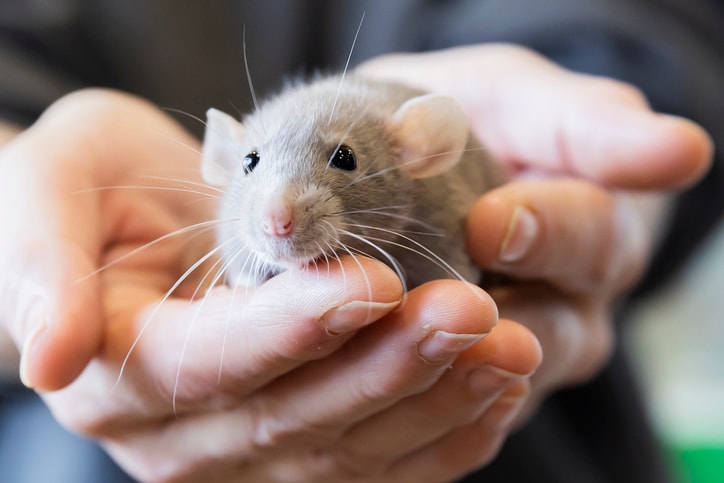Key points
- Rat-bite fever (RBF) is an infectious disease people can get from contact with rodents.
- Anyone can get RBF, but having pet rodents or working with rodents may increase your risk.
- If you have RBF symptoms and had recent contact with rodents, see a healthcare provider immediately.
- RBF must be treated quickly, or it can cause severe illness and possibly death.

Overview
Anyone can get RBF if they have contact with rodents infected with the bacteria that cause RBF. Certain groups of people are more at risk for this serious and sometimes deadly disease.
The rodents that carry RBF include rats, mice, gerbils, guinea pigs, and squirrels. The bacteria that cause RBF is part of the natural germs in these rodents' bodies. Rodents that are carrying the bacteria that cause RBF do not show signs of illness, so it's not possible to tell if a rodent carries the bacteria just by looking at it.
If you know you were bitten or scratched by a rodent, and you develop symptoms consistent with RBF, you should seek medical care immediately. The infection is resistant to many commonly used antibiotics. Getting treatment with the right antibiotics is important to keep the disease from progressing.
Thankfully, RBF is rare in the United States. But you should know many of these rodents that can carry it are popular pets, which can put people at risk. People who work in pet stores or labs with rodents also could be at higher risk.
Symptoms
The early symptoms of RBF can be like the flu. If you were infected by contact with rodents in North America, symptoms usually include fever, vomiting, headache, and muscle pain. About half of people will also have joint pain or swelling, and 3 in 4 will develop a rash.
Symptoms usually begin 3 to 10 days after your contact with rodents. They can appear up to 21 days after the contact. By that time, the bite or scratch should be healed. This might make it hard to remember you were bitten.
Within 2 to 4 days after the fever begins, a rash may appear on the hands and feet. This rash looks like flat, reddened areas with small bumps. One or more joints may then become swollen, red, or painful.
The bacteria that cause RBF in Asia can be different than the bacteria that causes RBF in North America. If you were infected by contact with rodents in Asia, your symptoms might be different. They can include fever, swelling around the bite if you have one, rash, and swollen lymph nodes. As with the type of RBF found in North America, getting early treatment is important to protecting your health.
Complications
Complications of RBF can include pockets of infected fluid in the body, like in your belly. The disease can also cause infections of many major organs, including the liver, kidneys, lungs, heart, brain, and nervous system.
Early treatment with antibiotics is important to try to prevent complications of RBF. These complications can include pockets of infected fluid in the body, like in your belly. The disease can also cause infections of many major organs, including the liver, kidneys, lungs, heart, brain, and nervous system. These complications are rare but can be very serious and even deadly.
How it spreads
RBF can spread to people through scratches, bites, or contact with a rodent's saliva or pee. It can also spread by having contact with contaminated materials (rat bedding, cages, etc.), kissing pet rats, or eating or drinking contaminated food or drinks. RBF transmission does not necessarily require contact with rodents.
If you have pet rodents or handle rodents as feed for snakes/reptiles, you can be at increased risk for RBF. Other at risk include people who work at pet stores or laboratories where they may have contact with rodents.
Although rare, some animals like dogs, cats, ferrets, and rabbits can be infected by contact with infected rodents and then pass the infection on to people. People usually start to show signs they are sick 3-10 days after exposure. RBF cannot spread between people.
Prevention
You can lower your risk for RBF by avoiding contact with rodents, places with rodent infestations, or other areas where rodents may be present.
Although RBF is rare, it is important to take precautions and practice good hygiene when handling or coming into contact with rodents or potentially contaminated materials.
If you have pet rodents, handle rodents as feed for reptiles, or work with rodents in a pet store or laboratory, protect yourself from RBF by following CDC's small mammal guidance.
Treatment and recovery
If you develop signs or symptoms of RBF, immediately contact a healthcare provider. Make sure to tell your provider about your contact with rodents.
Antibiotics can cure the disease if treatment is started soon after you become sick. It is important that you follow your healthcare provider's instructions. Take all of the medicine prescribed to you, even if you start to feel better.
These courses of treatment are very effective but if for some reason your symptoms worsen, see your health care provider immediately.
